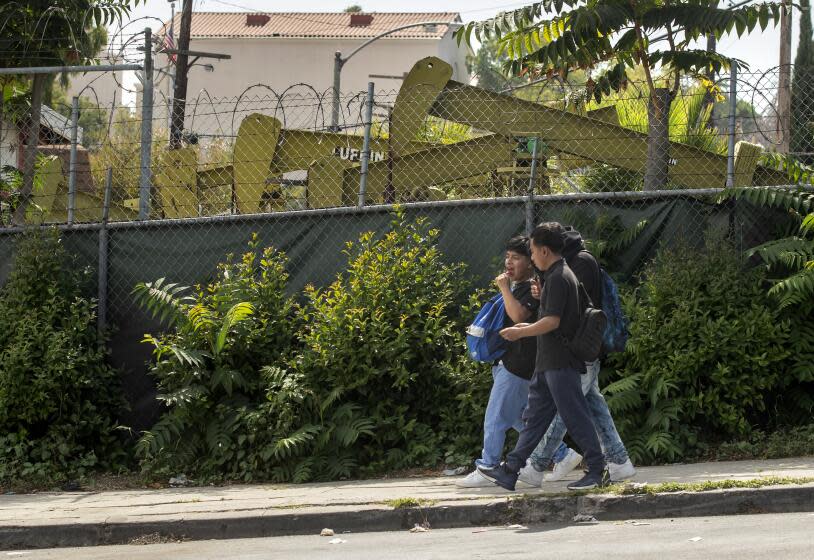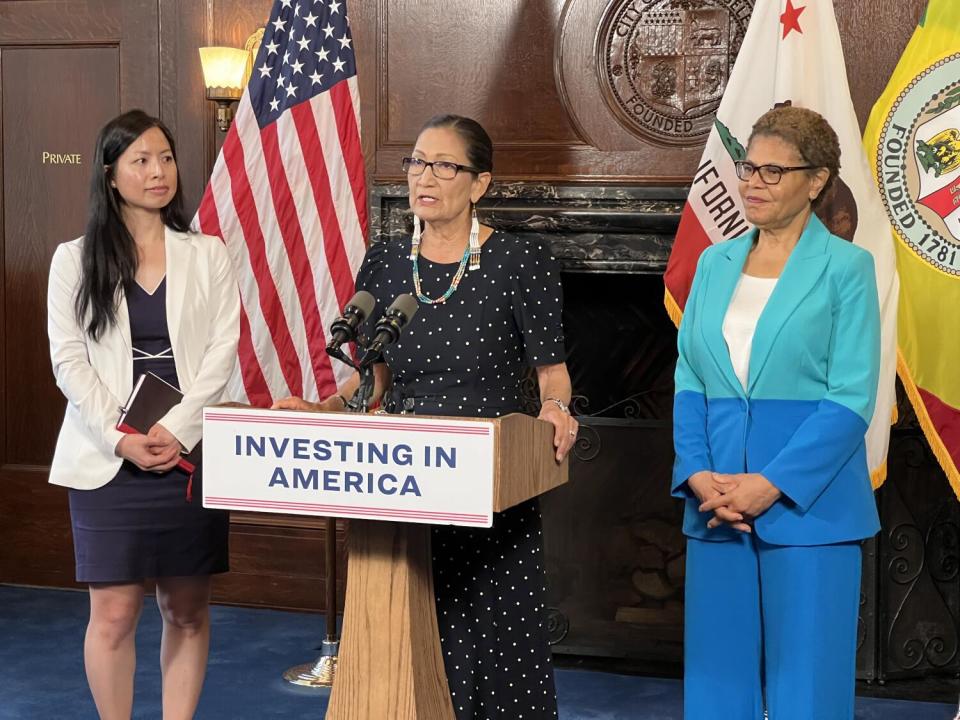California's effort to plug abandoned, chemical-spewing oil wells gets $35-million boost

California will receive more than $35 million in federal funding to help address the scourge of abandoned oil wells that are leaking dangerous chemicals and planet-warming methane in areas across the state, including many in Los Angeles.
The investment from the Biden-Harris administration is among the "largest ever in American history to address legacy pollution," U.S. Secretary of the Interior Deb Haaland said Friday during a joint announcement with Los Angeles Mayor Karen Bass and California Deputy Secretary for Energy Le-Quyen Nguyen.
California will use the funding to plug and remediate 206 high-risk orphaned oil and gas wells and decommission 47 attendant production facilities with about 70,000 feet of associated pipelines.
"Capping hazardous orphaned wells and addressing legacy pollution across our country will have a profound impact on our environment, our water quality, and the health and well-being of our communities," Haaland said.
The Golden State is home to at least 5,300 abandoned or orphaned oil wells — or wells for which there are no legally liable parties to plug them — according to estimates from the California Geologic Energy Management Division. There are more than 35,000 known idle wells, with thousands more that will soon come to the end of their lives.
Many are located in and around communities where residents have been sickened by their toxic emissions. What's more, many unclogged wells leak methane, a planet-warming gas that is more than 25 times as potent as carbon dioxide at trapping heat in the atmosphere.

"We have thousands of orphaned wells in California, and each well poses a risk to public health, safety and the environment, as well as further contributes to climate change," Nguyen said. "The funding that was announced today by Secretary Haaland will continue our momentum in plugging these orphaned wells in California, as well as remediating those sites and removing that legacy pollution. It will also make a meaningful, positive impact to our communities, as well as creating good jobs."
California's award is part of a larger, $660-million formula grant pot that will be released to states on a rolling basis, Haaland said.
As part of its award, California will also work to detect and measure methane emissions from orphaned oil and gas wells, screen for groundwater and surface water impacts, and prioritize cleaning up wells near disadvantaged communities.
Read more: Newsom signs bills to address unplugged oil wells, disclose corporate greenhouse gas emissions
The grant program stems from an overall $4.7-billion investment from President Biden's Bipartisan Infrastructure Law to plug orphaned wells nationwide.
Other buckets of funding include more than $565 million in initial grant funding that has already been awarded to 25 states, including $25 million to California. A planned matching grants program will also award up to $30 million apiece to states that commit to increasing their spending on cleaning up orphaned wells.
Bass said it was too soon to specify how much of the state's latest award will go to Los Angeles. However, state officials said some of the initial funding is being used to plug 19 wells that remain uncapped at the AllenCo drill site in South Los Angeles, which stand among more than 370 high-priority wells identified in the first round of planning.
Residents who live near the AllenCo site have complained for years about headaches, nosebleeds, respiratory diseases and other health issues. Among them is Nalleli Cobo, who grew up about 30 feet from the site and was diagnosed with reproductive cancer at age 19.
"I've lost my childhood to the fossil fuel industry and I've also lost my future to the fossil fuel industry, and that's not the reality that our community should be facing," Cobo said. "When you ask a person what belongs in a community, not a lot of people will say an oil well."
She noted that about 18 million Americans live one mile or less from an active oil or gas well.
Friday's federal investment announcement is "definitely a step in the right direction," she said, "but we need to make sure we are prioritizing communities like sacrifice zones, because we are the front-line communities that live day in and day out breathing these toxic emissions."
Read more: California lawmakers have a plan to plug old, vapor-spewing oil wells. Could it backfire?
Officials said the latest round of funding advances Biden's Justice40 Initiative, which aims to deliver at least 40% of benefits from certain climate, housing and energy investments to disadvantaged communities.
"This is an issue of environmental justice," Bass said. "Today we are locking arms across the city, state and federal governments to continue our work to end neighborhood oil drilling in the city of Los Angeles to protect the health of Angelenos and advance our vision of environmental justice."
Since the enactment of Biden's Bipartisan Infrastructure Law in 2021, states have plugged more than 7,700 orphaned wells and reduced approximately 11,530 metric tons of potential methane emissions, according to the Department of the Interior.
Gov. Gavin Newsom in October also approved AB 1167, legislation that will require companies that acquire oil wells to secure bonds to properly seal the wells once their use has ended. Some local communities, such as Culver City, have banned new drilling and are moving to phase out existing wells.
"California is one of the states that is leading the way in putting these new resources to work, because it's going to take all of us working together to ensure that we are making the kind of enduring impact that will last for generations to come," Haaland said.
But while the federal support is encouraging, there is still much work that remains, said Brenda Valdivia, a lifelong resident of the Vista Hermosa Heights neighborhood in L.A.
Valdivia said she developed an autoimmune disease and had two strokes following her exposure to nearby wells.
"We could always do more," she said.
Times staff writer Tony Briscoe contributed to this report.
This story originally appeared in Los Angeles Times.


